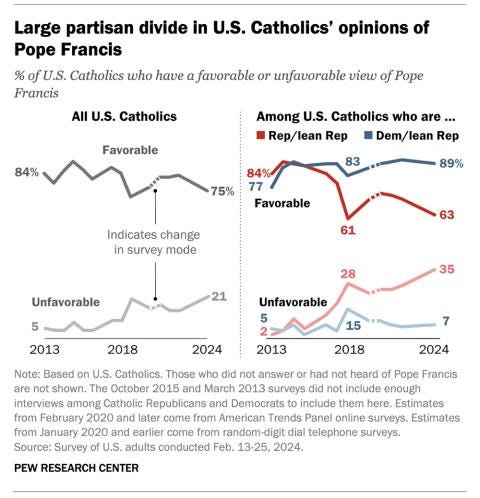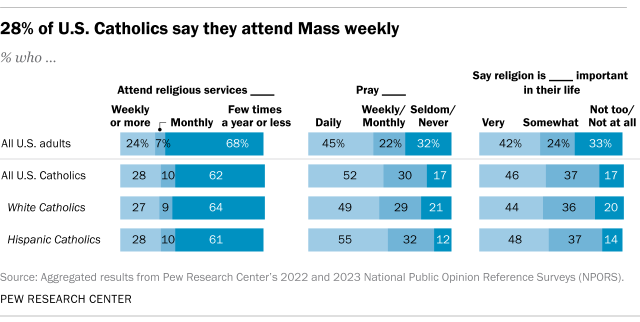Pope Francis Gets High Ratings Among U.S. Catholics, But He's Losing Ground with Republicans
Pew Research cites the largest partisan gap in its 14 surveys measuring the pontiff's popularity among U.S. Catholics.
By Gary Gately
U.S Catholics have become more polarized in their views of Pope Francis than at any other time in his 11 years as pope, though solid majorities of both major political parties view him positively, according to a new Pew Research Center survey.
Overall, the survey found that 75% of American Catholics view Francis positively, down from 83% in 2021. Among Catholics who are Democrats or “Democratic-leaning” in their politics, 89% view the pope positively, compared with 63% of Republican or “Republican-leaning” Catholics.
Among Republican and Republican-leaning Catholics, the unfavorable rating of Francis rose to 35%. And this marks the first time that more than 28% of Catholic Republicans have expressed an unfavorable view of Francis in the 14 surveys measuring his favorability ratings, according to the new survey.
In 2013, when Francis became pope, a Pew survey of American Catholics’ views of him found that he had a higher positive rating among Republicans (84%) than Democrats (77%).
“The overall drop in favorability reflects growing dissatisfaction with the current pope among Catholics who identify as Republicans or Independents who lean towards the Republican Party,” Pew researchers wrote. "The partisan gap in views of Pope Francis is as large as it's ever been in our surveys."
But just 7% of Catholic Democrats and those who lean Democratic held an unfavorable view of Francis.
Many Republicans and Republican-leaning Catholics have taken offense with Francis’ outspokenness on climate change, his criticisms of countries that shut down their borders to desperate migrants, his welcoming LGBTQ Catholics into the Church and his attacks on capitalism.
(Pew conducted the survey in February, about two months before the Vatican released the 20-page “Dignitas Infinita” — Infinite Dignity. It condemned gender theory, sex-change surgery and surrogate parenthood as “grave threats” to human dignity.)
Francis has enjoyed high ratings among U.S. Catholics throughout his tenure. The Argentina-born Francis — the first Jesuit pope and the first from Latin America — has received favorable ratings of 80% or more in all 14 Pew surveys gauging his popularity among U.S. Catholics. His favorability rating peaked at 90% in February 2015, about two months after he confirmed his visit to the U.S.
Francis has generally been viewed more positively than his immediate predecessor, Pope Benedict XVI, but less so than Benedict’s predecessor, Pope John Paul II, who received favorability ratings of more than 90% in the three polls Pew conducted about his popularity among U.S. Catholics. Benedict’s favorability ratings varied between 67% and 83% during his papacy.
Pope Francis canonized John Paul II, along with Pope John XXIII, in 2014.
The 87-year-old Francis’ 75% favorability rating is his second lowest. The lowest — 72% — came in September 2018 shortly after Archbishop Carlo Maria Viganò alleged that he had warned Francis about Cardinal Theodore McCarrick’s sexually predatory behavior but that Francis had ignored the warning.
Regardless of their political leanings, most U.S. Catholics view Francis as an “agent of change”: 70% say he represents a change in direction for the Church, and 42% say he represents a major change in direction.
Many U.S. Catholics would welcome more change. For example, the survey found:
83% of U.S. Catholics want the church to allow the use of contraception.
75% say the church should allow Catholics to receive Holy Communion even if they are unmarried and living with a romantic partner.
69% say priests should be allowed to marry.
64% say women should be allowed to become priests.
54% say the church should recognize the marriages of gay and lesbian couples.
Pew did not touch on the December Vatican declaration, formally approved by Francis, allowing priests to bless same-sex and “irregular” couples. The “Fiducia Supplicans” (Supplicating Trust) declaration has drawn vociferous criticism from some prelates, particularly in Africa, Germany and Eastern Europe, and divided Americans.
On another hot-button issue, abortion, the survey found 6 in 10 Catholics say it should be legal in all or most cases.
That puts them squarely at odds with Church teaching, articulated anew in a November voters guide to the 2024 elections from the U.S. Conference of Catholic Bishops. The guide states: “The threat of abortion remains our preeminent priority because it directly attacks our most vulnerable and voiceless brothers and sisters and destroys more than a million lives per year in our country alone.”
Among Catholic Democrats, 78% believe abortion should be legal in most or all cases, compared with just 43% of Republican Catholics. Among those who attend Mass at least weekly, only 34% said abortion should be legal.
The survey also revealed stark differences in opinions on other Church teachings between Catholics who attend Mass at least weekly and those who do not. Much lower proportions of these regular Mass attendees favored allowing birth control; letting those unmarried but living with a romantic partner to receive Holy Communion; recognizing marriages of gay and lesbian couples; granting priests the right to marry; and allowing women priests.
Some Catholic Demographics
Based on its survey and U.S. Census figures, Pew estimates that 20% of U.S. adults (52 million) describe themselves as Catholic. That’s down from 27% since 2007.
28% of American Catholics say they attend Mass weekly or more often. Larger shares of Catholics say they pray daily (52%) and that religion is very important in their life (46%). 10% say they attend Mass a few times a year or less often and pray seldom or never and consider religion not too or not at all important in their lives.
About half of Catholic registered voters (52%) identify with or lean toward the Republican Party, compared with 44% who identify with or lean toward the Democratic Party. But partisan affiliation varies by race and ethnicity. 61% of White Catholic registered voters say they identify with or lean toward the GOP, compared with 35% of Hispanic Catholics. By contrast, 60% of Hispanic Catholics who are registered voters say they identify with or lean toward the Democratic Party, compared with 37% of White Catholics. In the 2022 congressional midterm elections, 56% of Catholics said they voted for Republican candidates and 43% for Democrats. And in the 2020 presidential election, 49% voted for Donald Trump and 50% for Joe Biden.
The U.S. Catholic population is 57% White, 33% Hispanic, 4% Asian, 2% Black and 3% of another race. Since 2007, the share of U.S. Catholics who are White has dropped by 8 percentage points, while the share who are Hispanic has risen 4 points.
58% of American Catholics are ages 50 and older, but Hispanic Catholics tend to be much younger than White Catholics. Just 43% of Hispanic Catholics are 50 and older, compared with 68% of White Catholics. And only 14% of Hispanic Catholics are ages 65 and older, compared with 38% of White Catholics.
29% of U.S. Catholics live in the South, 26% in the Northeast, 24% in the West and 21% in the Midwest. The racial and ethnic profile of the Catholic population varies widely by region.
32% of U.S. Catholics have a bachelor’s degree, while another 28% have some college education but not a bachelor’s degree, and 40% have a high school education or less. These proportions closely resemble those of the general population.
— Pew Research Center (Updated April 12, 2024)











Thanks for this informative post. Id love to see stats like this for italy. I was there last winter and was surprised how much dislike there was for francis amongst all types of catholics, not just right wing types.